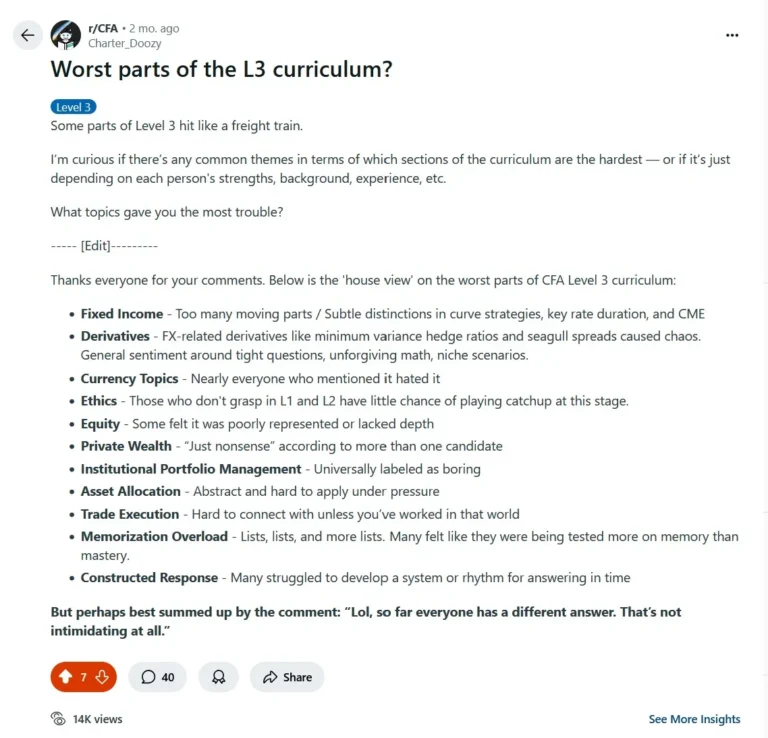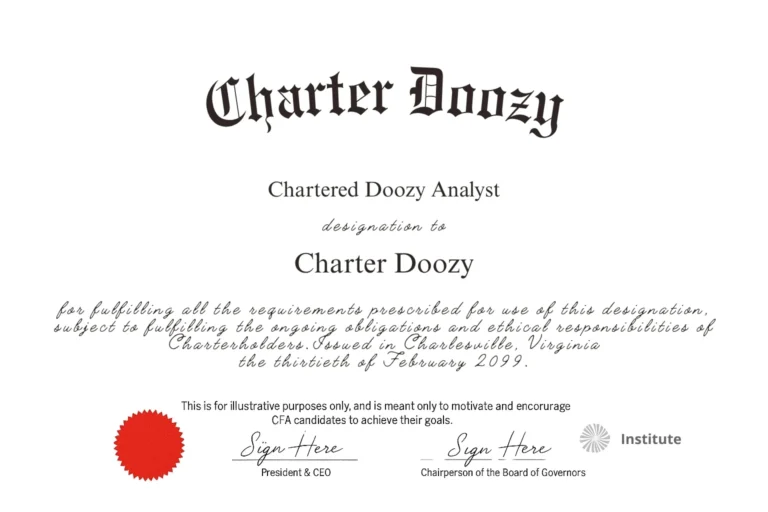If CFA Level 1 is about breadth and Level 2 about depth, then Level 3 is a beast of its own — complex, constructed-response heavy, and deceptively subtle.
To understand what really trips candidates up in Level 3, we analyzed insights from a popular Reddit thread on r/CFA. Despite only 7 upvotes, the post earned 15,000+ views, 40 comments, 11 shares, and 3 crossposts, drawing in feedback from dozens of CFA candidates across the world.
Here’s what they said.

Fixed Income: Too Many Moving Parts
“Everything FI-related — too many moving parts and subtle distinctions.” – u/Charter_Doozy
The Fixed Income section was frequently mentioned as one of the toughest. Key rate duration, curve strategies, and concepts from the CME reading confused even experienced candidates.
Even those with strong equity backgrounds admitted that Fixed Income took far longer to master. The distinctions between Macaulay Duration, Modified Duration, and Effective Duration seemed to create a mental pile-up for many.
One candidate shared how they knew the “what,” but not the “why” — and that going back to basics helped them finally break through.
Derivatives & Currency: A Double Dose of Confusion
“Minimum variance hedge ratio, seagull spreads… tight questions, unforgiving math, niche scenarios.” – Community summary
“That currency stuff. And I have 6 years of FX experience.” – u/Wonderful-Sail2696
Foreign exchange derivatives, particularly FX forwards and hedging strategies, were an unexpected killer. Candidates who work in FX professionally admitted to being stumped by the academic approach.
Specific instruments like minimum variance hedge ratios and seagull spreads caused panic — especially when candidates hadn’t seen them in third-party prep materials. Worse, the CFAI curriculum covers them briefly, yet expects deep understanding.

Memorization Overload: Lists, Lists, Lists
“Memorizing all the stupid lists. It doesn’t even matter which section.” – u/financestudent6958
Nearly every section — from ethics to execution — seemed to include “advantages vs disadvantages,” “uses,” “limitations,” or “best practices.” Candidates joked about recognizing list shapes rather than understanding the content.
Flashcards helped some. Others recommended building bullet-pointed summaries from day one. Either way, everyone agreed: Level 3 has a serious list problem.

Constructed Response (Essay): The Format from Hell
“It took me a long time to develop a system on how to answer constructed response essays.” – u/Charter_Doozy
It’s not just the content — it’s the format.
The constructed response section (the infamous CFA essay) demands clear, concise, bullet-style answers under tight time constraints. Many candidates said it took months to develop a rhythm.
Others struggled to figure out what the question was actually asking — especially when points were lost for including too much information or answering in a non-standard format.
Ethics: Still Deceptively Tricky
“No matter how much I study the damn topic, CFA views me as an unethical person.” – u/RemarkableInsect673
Despite being tested in every level, Ethics remains a stumbling block in Level 3 — especially for those who never truly mastered it earlier.
Candidates described Ethics questions as “logic puzzles wrapped in moral ambiguity,” with many scoring consistently well on practice questions but still underperforming in the real exam.
The advice? Keep a running list of ethical nuances, practice frequently, and pay special attention to subtle differences in scenarios.
Private Wealth & Institutional PM: Boring, Vague, or Just “Nonsense”
“Private Wealth reading — just nonsense.” – u/Itry_My_Best
“Institutional Portfolio Management — boringggg.” – u/Uncle2Drew
Some candidates found Private Wealth Management intellectually frustrating. Others, especially those pursuing careers in private wealth, defended it — but acknowledged the dry delivery and awkward application.
Institutional Portfolio Management, on the other hand, was almost universally described as boring, with long readings that rarely felt relevant or actionable.
Trade Execution: Disconnected from Reality
“Hard to connect with unless you’ve worked in that world.” – Summary
“Nothing like reading about VWAP when your execution strategy is clicking ‘Buy’ in Robinhood.” – u/Charter_Doozy
Trade execution concepts like VWAP, implementation shortfall, and slippage were seen as difficult to internalize without real-world institutional trading experience. Candidates in retail investing roles often found the material alienating or theoretical.
Asset Allocation: Abstract & Hard to Apply
“Asset allocation… just hard to make sense of under pressure.” – u/MiserableChip8440
While technically rich, the Asset Allocation material was flagged as overly abstract. Candidates struggled to apply frameworks like Black-Litterman and resampled efficient frontiers in practical ways — especially in exam-style questions.
Equity: Poorly Represented?
“Equity — very bad representation.” – u/master_bamako
Some candidates felt that the Equity section lacked depth or structure compared to other topics. It didn’t necessarily show up heavily on mocks, which made preparation feel directionless.
The Final Takeaway: Everyone Has a Different Nemesis
“Lol, so far everyone has a different answer. That’s not intimidating at all.” – u/okonkolero
This sums it up.
For some, Fixed Income was a disaster. Others breezed through it and found Ethics impossible. One person hated Private Wealth; another built their whole career on it.
The truth? Level 3 is unpredictable — both in content and in format.
Summary Table: Worst CFA Level 3 Topics by Candidate Feedback
| Topic | Why It’s Hard |
|---|---|
| Fixed Income | Subtle distinctions, too many moving parts |
| FX & Derivatives | Niche instruments, brutal math, low prep coverage |
| Currency | Unforgiving, even for FX professionals |
| Ethics | Ambiguous judgment calls despite years of practice |
| Private Wealth | “Nonsense” or vague application |
| Institutional PM | Long, boring readings with limited payoff |
| Asset Allocation | Abstract frameworks under time pressure |
| Trade Execution | Hard to relate to without institutional experience |
| Constructed Response | Difficult to master under time constraints |
| Memorization Overload | Endless lists, categories, and classifications |
Final Thoughts
The CFA Level 3 curriculum can feel like death by details. But the more you know what frustrates others, the better you can prepare.
Some advice from the community:
Practice constructed response early.
Start your own flashcard set for lists.
Don’t skip FX and derivatives — even if they’re “short readings.”
Don’t rely on third-party providers alone.
Most importantly? Keep perspective.
The Reddit thread that inspired this article may have sparked 15,000+ views and 40 comments, but the underlying message is clear:
Everyone struggles with something. You’re not alone.

